The Role of Interpersonal Communication in Change Management Processes
VerifiedAdded on 2021/12/17
|10
|1858
|68
Report
AI Summary
This report delves into the critical importance of interpersonal communication within the context of change management in organizations. The executive summary emphasizes that effective communication is vital for successful change implementation, highlighting the need for leaders to foster open communication channels. The report addresses the problem of resistance to change by underscoring the role of interpersonal communication in conveying change procedures to employees. It explores research from various authors, including Berger, Wood, and others, to emphasize that effective communication involves clear messaging, active listening, and understanding the circumstances of the audience. The analysis section synthesizes the research, emphasizing that organizations undergoing change must engage in consistent and frequent communication across multiple channels. The report recommends providing employees with opportunities to ask questions, effectively communicating the vision and mission, and fostering two-way discussions. Moreover, it highlights the importance of communicating the reasons for change, with management demonstrating active listening and thoughtfulness. The conclusion reinforces the significance of interpersonal communication as a key factor in facilitating successful change management and long-term organizational success.
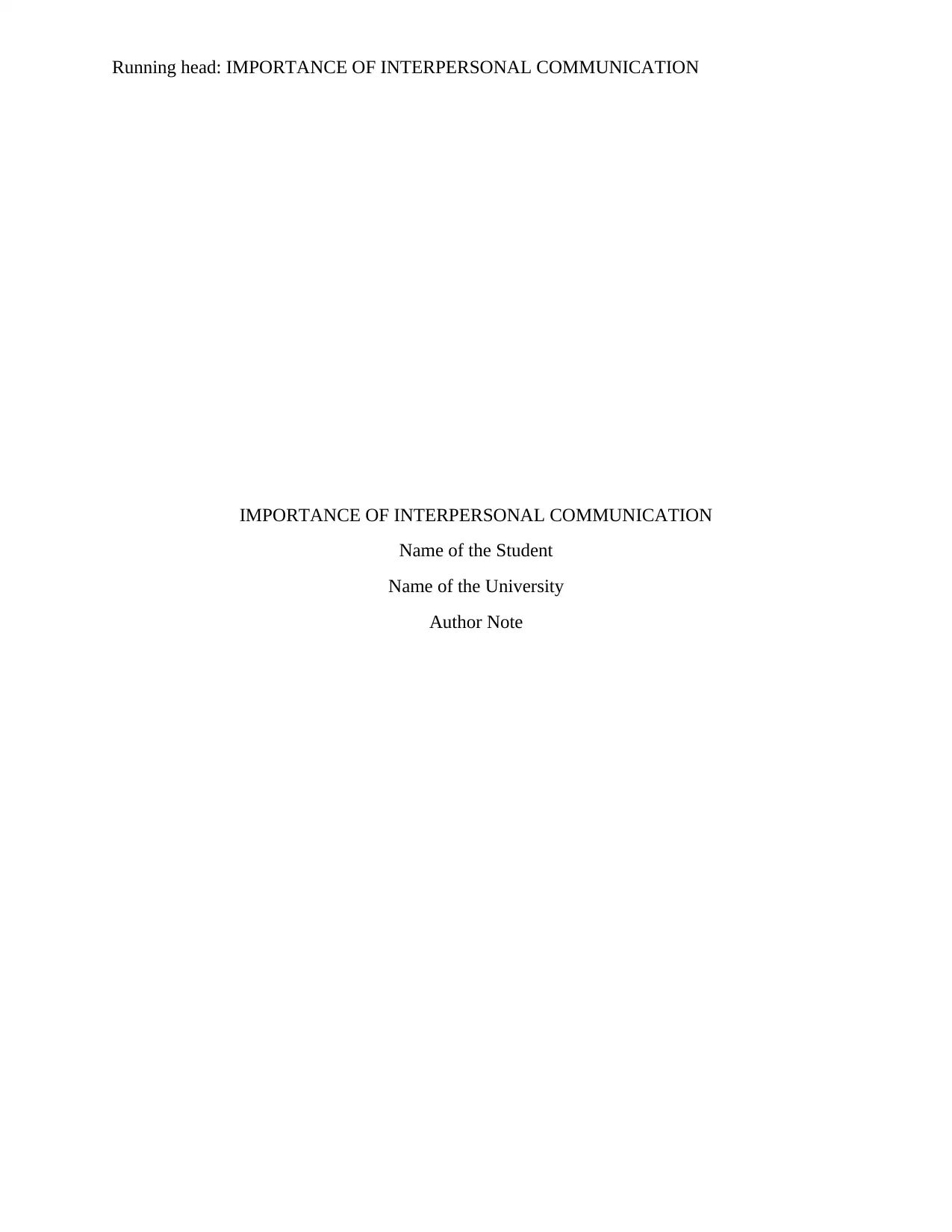
Running head: IMPORTANCE OF INTERPERSONAL COMMUNICATION
IMPORTANCE OF INTERPERSONAL COMMUNICATION
Name of the Student
Name of the University
Author Note
IMPORTANCE OF INTERPERSONAL COMMUNICATION
Name of the Student
Name of the University
Author Note
Paraphrase This Document
Need a fresh take? Get an instant paraphrase of this document with our AI Paraphraser
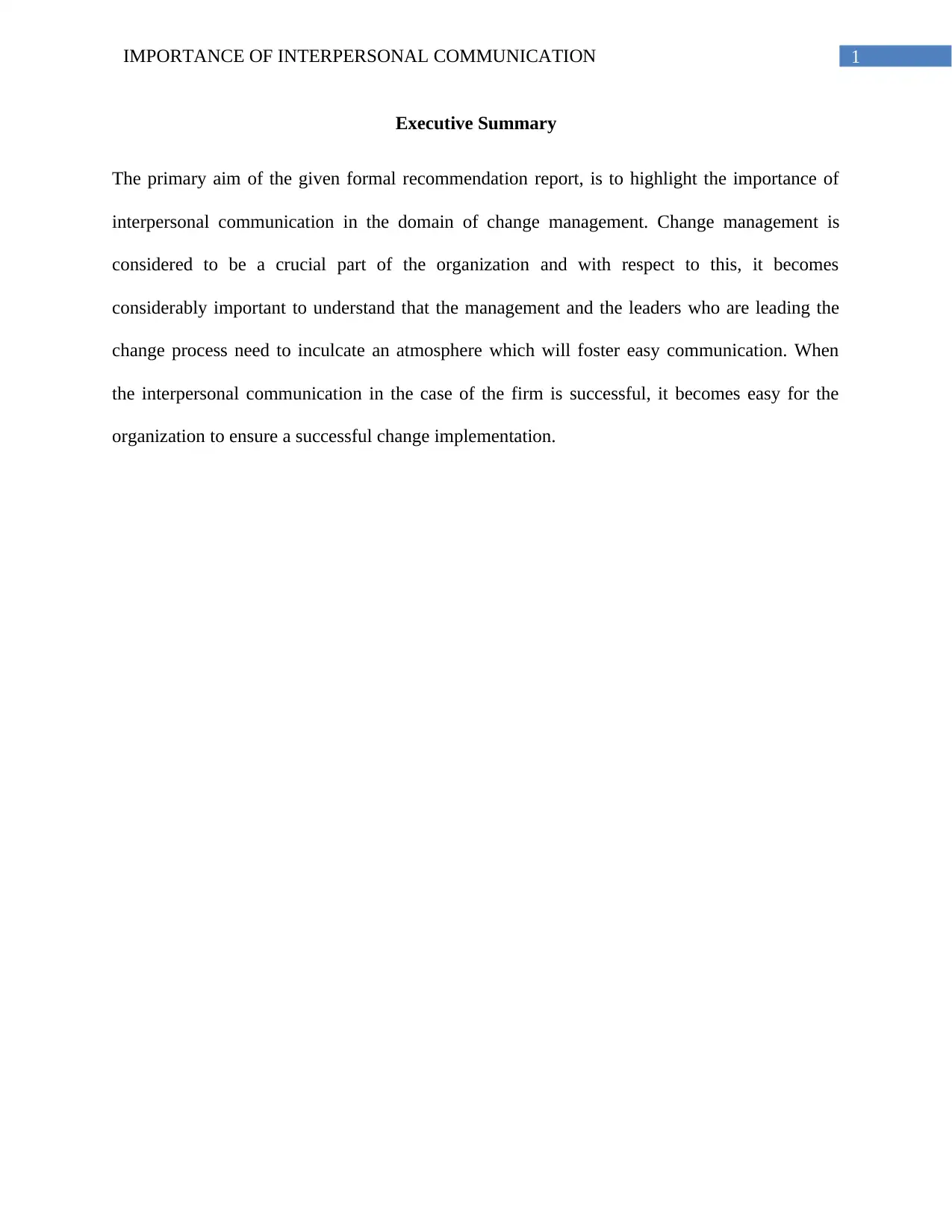
1IMPORTANCE OF INTERPERSONAL COMMUNICATION
Executive Summary
The primary aim of the given formal recommendation report, is to highlight the importance of
interpersonal communication in the domain of change management. Change management is
considered to be a crucial part of the organization and with respect to this, it becomes
considerably important to understand that the management and the leaders who are leading the
change process need to inculcate an atmosphere which will foster easy communication. When
the interpersonal communication in the case of the firm is successful, it becomes easy for the
organization to ensure a successful change implementation.
Executive Summary
The primary aim of the given formal recommendation report, is to highlight the importance of
interpersonal communication in the domain of change management. Change management is
considered to be a crucial part of the organization and with respect to this, it becomes
considerably important to understand that the management and the leaders who are leading the
change process need to inculcate an atmosphere which will foster easy communication. When
the interpersonal communication in the case of the firm is successful, it becomes easy for the
organization to ensure a successful change implementation.
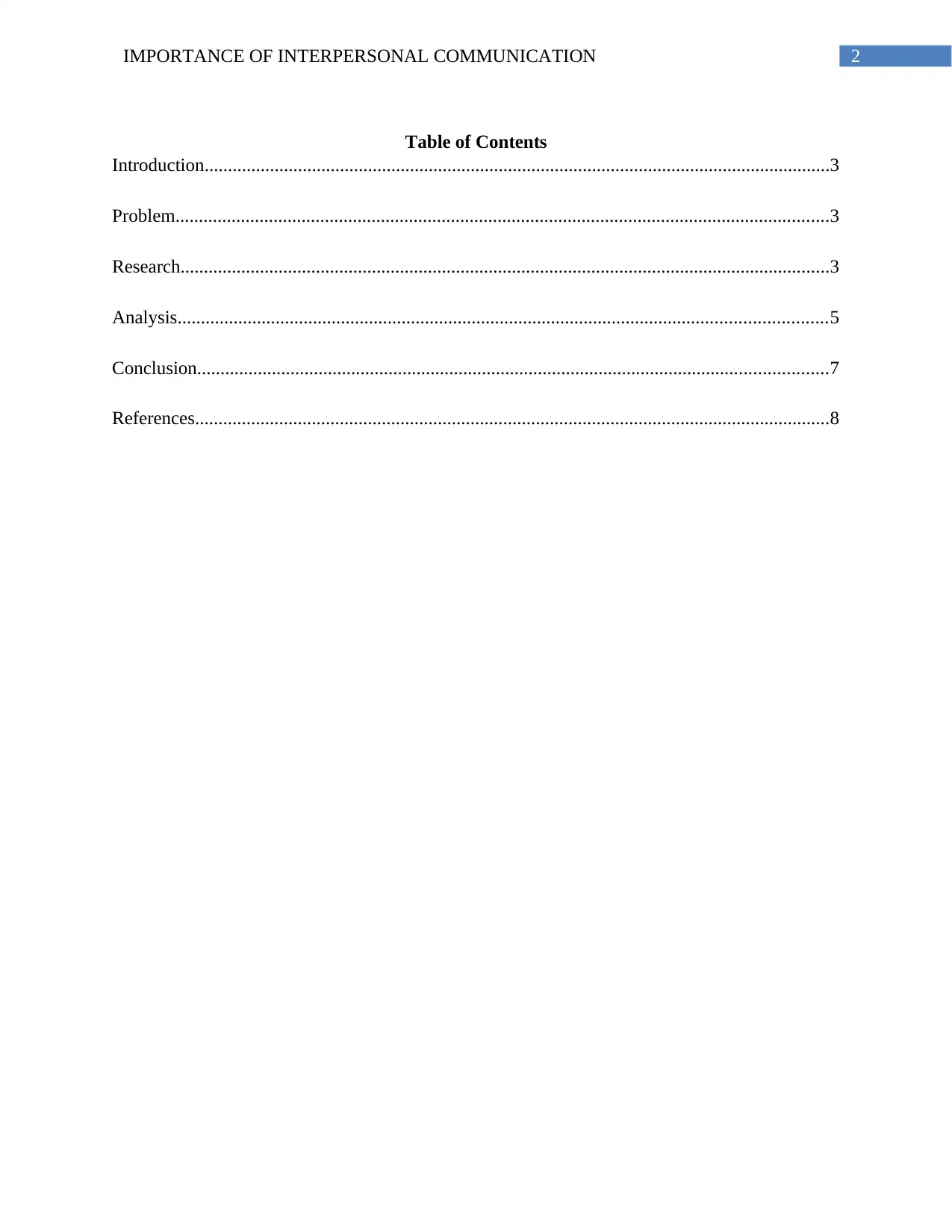
2IMPORTANCE OF INTERPERSONAL COMMUNICATION
Table of Contents
Introduction......................................................................................................................................3
Problem............................................................................................................................................3
Research...........................................................................................................................................3
Analysis...........................................................................................................................................5
Conclusion.......................................................................................................................................7
References........................................................................................................................................8
Table of Contents
Introduction......................................................................................................................................3
Problem............................................................................................................................................3
Research...........................................................................................................................................3
Analysis...........................................................................................................................................5
Conclusion.......................................................................................................................................7
References........................................................................................................................................8
⊘ This is a preview!⊘
Do you want full access?
Subscribe today to unlock all pages.

Trusted by 1+ million students worldwide
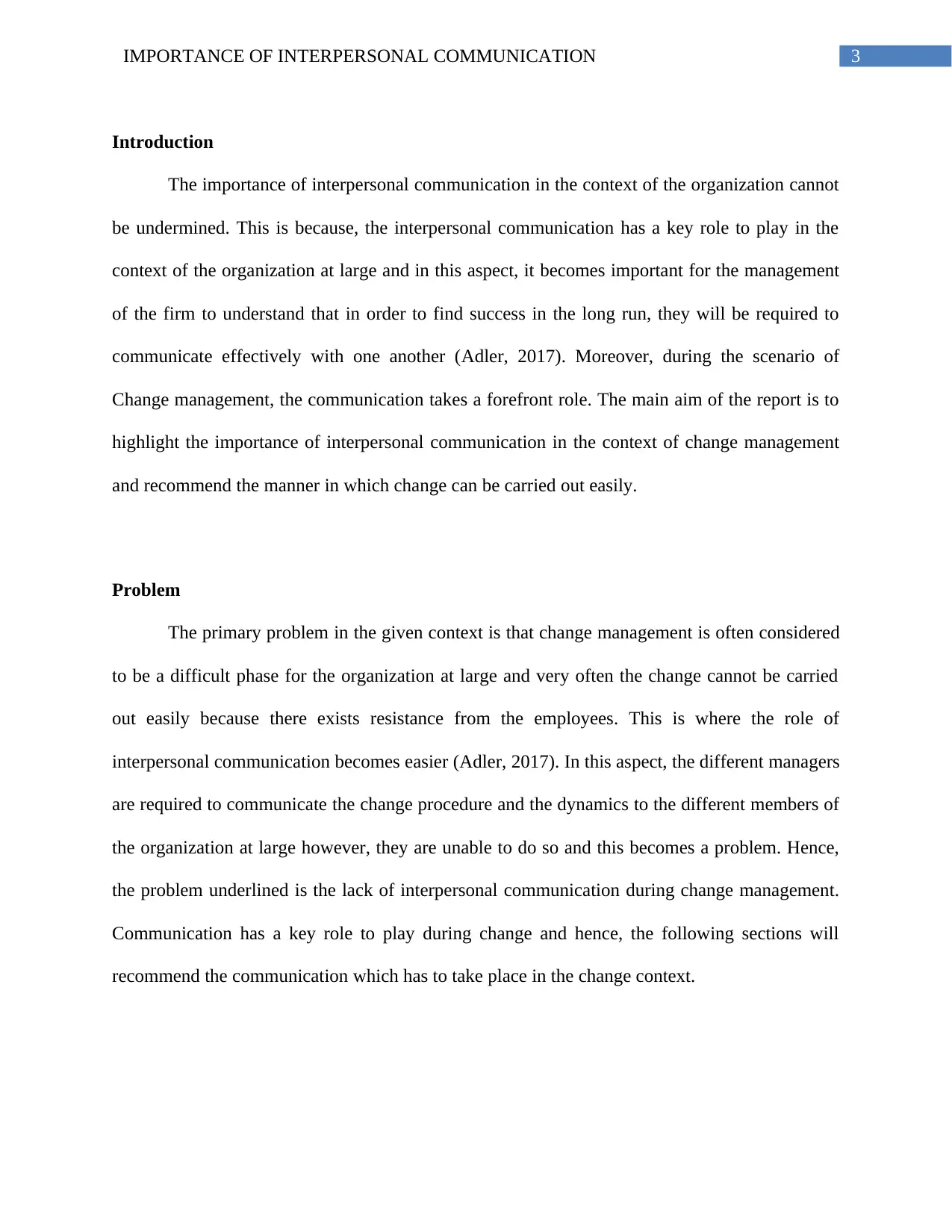
3IMPORTANCE OF INTERPERSONAL COMMUNICATION
Introduction
The importance of interpersonal communication in the context of the organization cannot
be undermined. This is because, the interpersonal communication has a key role to play in the
context of the organization at large and in this aspect, it becomes important for the management
of the firm to understand that in order to find success in the long run, they will be required to
communicate effectively with one another (Adler, 2017). Moreover, during the scenario of
Change management, the communication takes a forefront role. The main aim of the report is to
highlight the importance of interpersonal communication in the context of change management
and recommend the manner in which change can be carried out easily.
Problem
The primary problem in the given context is that change management is often considered
to be a difficult phase for the organization at large and very often the change cannot be carried
out easily because there exists resistance from the employees. This is where the role of
interpersonal communication becomes easier (Adler, 2017). In this aspect, the different managers
are required to communicate the change procedure and the dynamics to the different members of
the organization at large however, they are unable to do so and this becomes a problem. Hence,
the problem underlined is the lack of interpersonal communication during change management.
Communication has a key role to play during change and hence, the following sections will
recommend the communication which has to take place in the change context.
Introduction
The importance of interpersonal communication in the context of the organization cannot
be undermined. This is because, the interpersonal communication has a key role to play in the
context of the organization at large and in this aspect, it becomes important for the management
of the firm to understand that in order to find success in the long run, they will be required to
communicate effectively with one another (Adler, 2017). Moreover, during the scenario of
Change management, the communication takes a forefront role. The main aim of the report is to
highlight the importance of interpersonal communication in the context of change management
and recommend the manner in which change can be carried out easily.
Problem
The primary problem in the given context is that change management is often considered
to be a difficult phase for the organization at large and very often the change cannot be carried
out easily because there exists resistance from the employees. This is where the role of
interpersonal communication becomes easier (Adler, 2017). In this aspect, the different managers
are required to communicate the change procedure and the dynamics to the different members of
the organization at large however, they are unable to do so and this becomes a problem. Hence,
the problem underlined is the lack of interpersonal communication during change management.
Communication has a key role to play during change and hence, the following sections will
recommend the communication which has to take place in the change context.
Paraphrase This Document
Need a fresh take? Get an instant paraphrase of this document with our AI Paraphraser
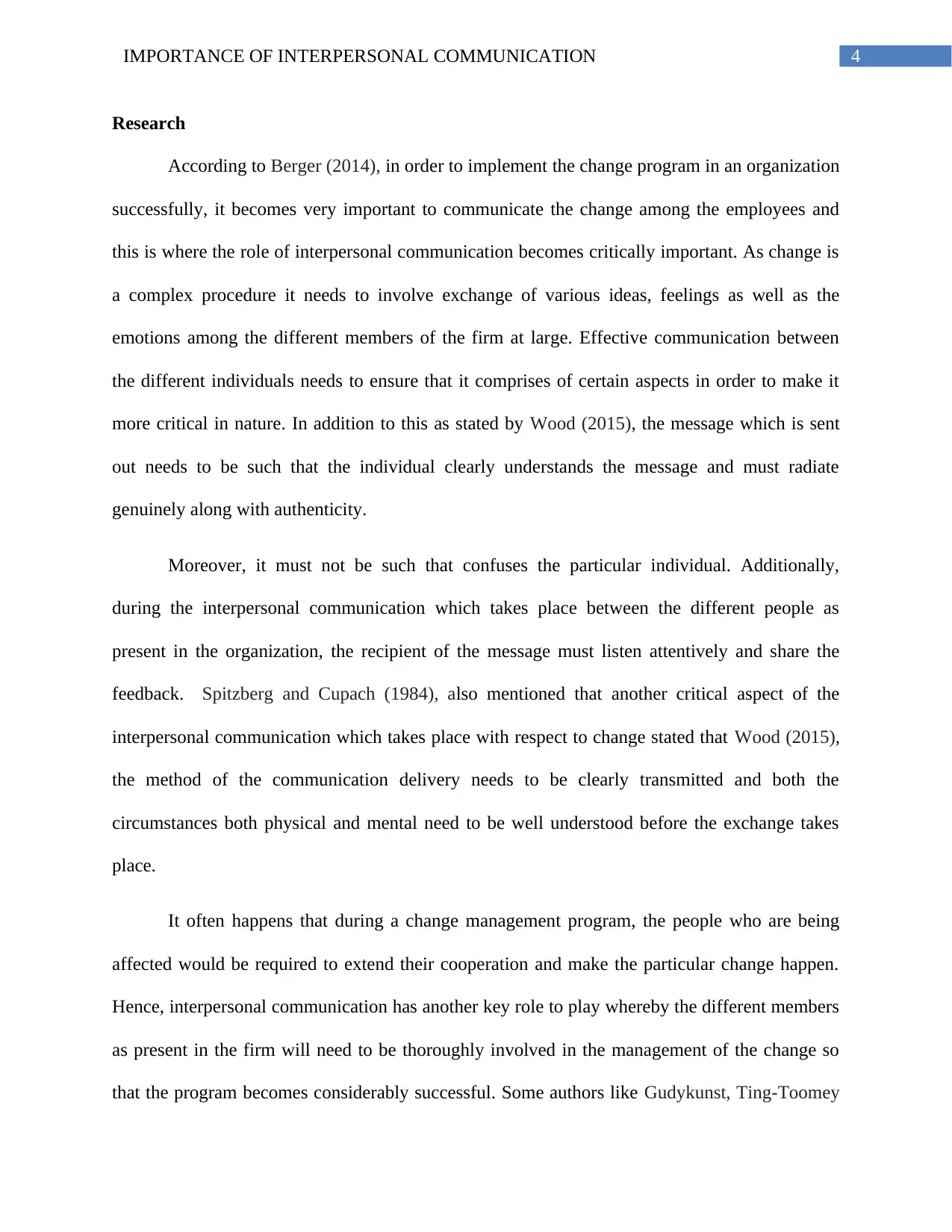
4IMPORTANCE OF INTERPERSONAL COMMUNICATION
Research
According to Berger (2014), in order to implement the change program in an organization
successfully, it becomes very important to communicate the change among the employees and
this is where the role of interpersonal communication becomes critically important. As change is
a complex procedure it needs to involve exchange of various ideas, feelings as well as the
emotions among the different members of the firm at large. Effective communication between
the different individuals needs to ensure that it comprises of certain aspects in order to make it
more critical in nature. In addition to this as stated by Wood (2015), the message which is sent
out needs to be such that the individual clearly understands the message and must radiate
genuinely along with authenticity.
Moreover, it must not be such that confuses the particular individual. Additionally,
during the interpersonal communication which takes place between the different people as
present in the organization, the recipient of the message must listen attentively and share the
feedback. Spitzberg and Cupach (1984), also mentioned that another critical aspect of the
interpersonal communication which takes place with respect to change stated that Wood (2015),
the method of the communication delivery needs to be clearly transmitted and both the
circumstances both physical and mental need to be well understood before the exchange takes
place.
It often happens that during a change management program, the people who are being
affected would be required to extend their cooperation and make the particular change happen.
Hence, interpersonal communication has another key role to play whereby the different members
as present in the firm will need to be thoroughly involved in the management of the change so
that the program becomes considerably successful. Some authors like Gudykunst, Ting-Toomey
Research
According to Berger (2014), in order to implement the change program in an organization
successfully, it becomes very important to communicate the change among the employees and
this is where the role of interpersonal communication becomes critically important. As change is
a complex procedure it needs to involve exchange of various ideas, feelings as well as the
emotions among the different members of the firm at large. Effective communication between
the different individuals needs to ensure that it comprises of certain aspects in order to make it
more critical in nature. In addition to this as stated by Wood (2015), the message which is sent
out needs to be such that the individual clearly understands the message and must radiate
genuinely along with authenticity.
Moreover, it must not be such that confuses the particular individual. Additionally,
during the interpersonal communication which takes place between the different people as
present in the organization, the recipient of the message must listen attentively and share the
feedback. Spitzberg and Cupach (1984), also mentioned that another critical aspect of the
interpersonal communication which takes place with respect to change stated that Wood (2015),
the method of the communication delivery needs to be clearly transmitted and both the
circumstances both physical and mental need to be well understood before the exchange takes
place.
It often happens that during a change management program, the people who are being
affected would be required to extend their cooperation and make the particular change happen.
Hence, interpersonal communication has another key role to play whereby the different members
as present in the firm will need to be thoroughly involved in the management of the change so
that the program becomes considerably successful. Some authors like Gudykunst, Ting-Toomey
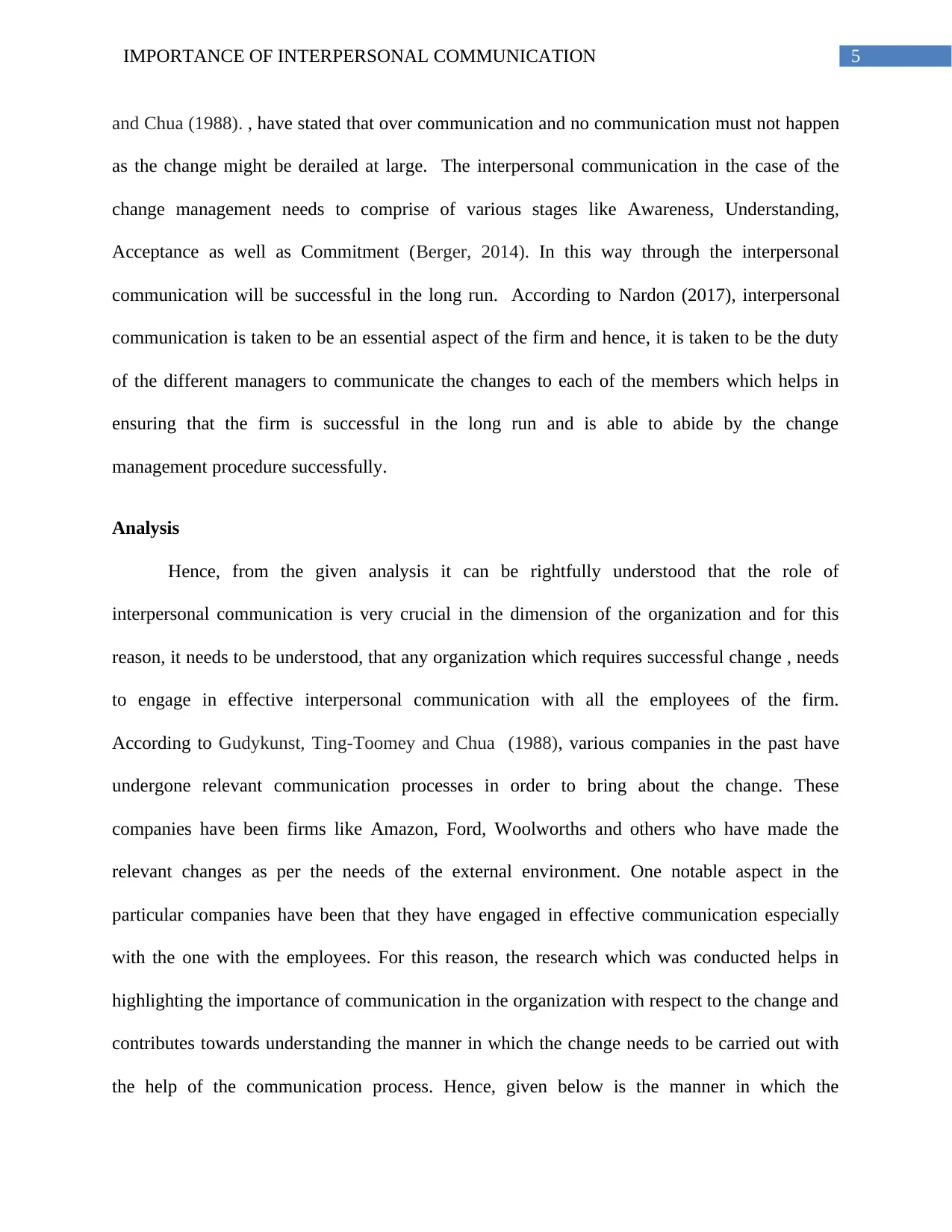
5IMPORTANCE OF INTERPERSONAL COMMUNICATION
and Chua (1988). , have stated that over communication and no communication must not happen
as the change might be derailed at large. The interpersonal communication in the case of the
change management needs to comprise of various stages like Awareness, Understanding,
Acceptance as well as Commitment (Berger, 2014). In this way through the interpersonal
communication will be successful in the long run. According to Nardon (2017), interpersonal
communication is taken to be an essential aspect of the firm and hence, it is taken to be the duty
of the different managers to communicate the changes to each of the members which helps in
ensuring that the firm is successful in the long run and is able to abide by the change
management procedure successfully.
Analysis
Hence, from the given analysis it can be rightfully understood that the role of
interpersonal communication is very crucial in the dimension of the organization and for this
reason, it needs to be understood, that any organization which requires successful change , needs
to engage in effective interpersonal communication with all the employees of the firm.
According to Gudykunst, Ting-Toomey and Chua (1988), various companies in the past have
undergone relevant communication processes in order to bring about the change. These
companies have been firms like Amazon, Ford, Woolworths and others who have made the
relevant changes as per the needs of the external environment. One notable aspect in the
particular companies have been that they have engaged in effective communication especially
with the one with the employees. For this reason, the research which was conducted helps in
highlighting the importance of communication in the organization with respect to the change and
contributes towards understanding the manner in which the change needs to be carried out with
the help of the communication process. Hence, given below is the manner in which the
and Chua (1988). , have stated that over communication and no communication must not happen
as the change might be derailed at large. The interpersonal communication in the case of the
change management needs to comprise of various stages like Awareness, Understanding,
Acceptance as well as Commitment (Berger, 2014). In this way through the interpersonal
communication will be successful in the long run. According to Nardon (2017), interpersonal
communication is taken to be an essential aspect of the firm and hence, it is taken to be the duty
of the different managers to communicate the changes to each of the members which helps in
ensuring that the firm is successful in the long run and is able to abide by the change
management procedure successfully.
Analysis
Hence, from the given analysis it can be rightfully understood that the role of
interpersonal communication is very crucial in the dimension of the organization and for this
reason, it needs to be understood, that any organization which requires successful change , needs
to engage in effective interpersonal communication with all the employees of the firm.
According to Gudykunst, Ting-Toomey and Chua (1988), various companies in the past have
undergone relevant communication processes in order to bring about the change. These
companies have been firms like Amazon, Ford, Woolworths and others who have made the
relevant changes as per the needs of the external environment. One notable aspect in the
particular companies have been that they have engaged in effective communication especially
with the one with the employees. For this reason, the research which was conducted helps in
highlighting the importance of communication in the organization with respect to the change and
contributes towards understanding the manner in which the change needs to be carried out with
the help of the communication process. Hence, given below is the manner in which the
⊘ This is a preview!⊘
Do you want full access?
Subscribe today to unlock all pages.

Trusted by 1+ million students worldwide
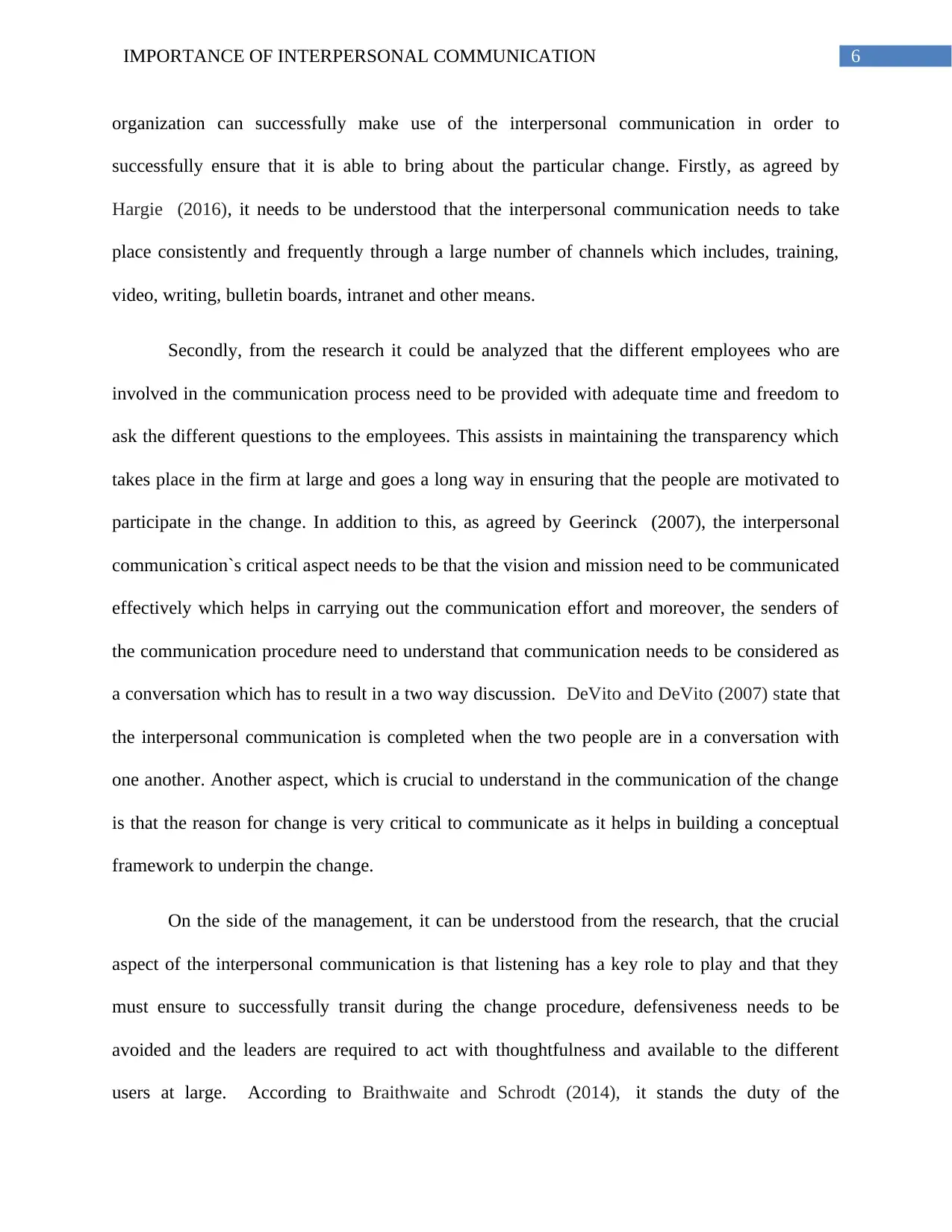
6IMPORTANCE OF INTERPERSONAL COMMUNICATION
organization can successfully make use of the interpersonal communication in order to
successfully ensure that it is able to bring about the particular change. Firstly, as agreed by
Hargie (2016), it needs to be understood that the interpersonal communication needs to take
place consistently and frequently through a large number of channels which includes, training,
video, writing, bulletin boards, intranet and other means.
Secondly, from the research it could be analyzed that the different employees who are
involved in the communication process need to be provided with adequate time and freedom to
ask the different questions to the employees. This assists in maintaining the transparency which
takes place in the firm at large and goes a long way in ensuring that the people are motivated to
participate in the change. In addition to this, as agreed by Geerinck (2007), the interpersonal
communication`s critical aspect needs to be that the vision and mission need to be communicated
effectively which helps in carrying out the communication effort and moreover, the senders of
the communication procedure need to understand that communication needs to be considered as
a conversation which has to result in a two way discussion. DeVito and DeVito (2007) state that
the interpersonal communication is completed when the two people are in a conversation with
one another. Another aspect, which is crucial to understand in the communication of the change
is that the reason for change is very critical to communicate as it helps in building a conceptual
framework to underpin the change.
On the side of the management, it can be understood from the research, that the crucial
aspect of the interpersonal communication is that listening has a key role to play and that they
must ensure to successfully transit during the change procedure, defensiveness needs to be
avoided and the leaders are required to act with thoughtfulness and available to the different
users at large. According to Braithwaite and Schrodt (2014), it stands the duty of the
organization can successfully make use of the interpersonal communication in order to
successfully ensure that it is able to bring about the particular change. Firstly, as agreed by
Hargie (2016), it needs to be understood that the interpersonal communication needs to take
place consistently and frequently through a large number of channels which includes, training,
video, writing, bulletin boards, intranet and other means.
Secondly, from the research it could be analyzed that the different employees who are
involved in the communication process need to be provided with adequate time and freedom to
ask the different questions to the employees. This assists in maintaining the transparency which
takes place in the firm at large and goes a long way in ensuring that the people are motivated to
participate in the change. In addition to this, as agreed by Geerinck (2007), the interpersonal
communication`s critical aspect needs to be that the vision and mission need to be communicated
effectively which helps in carrying out the communication effort and moreover, the senders of
the communication procedure need to understand that communication needs to be considered as
a conversation which has to result in a two way discussion. DeVito and DeVito (2007) state that
the interpersonal communication is completed when the two people are in a conversation with
one another. Another aspect, which is crucial to understand in the communication of the change
is that the reason for change is very critical to communicate as it helps in building a conceptual
framework to underpin the change.
On the side of the management, it can be understood from the research, that the crucial
aspect of the interpersonal communication is that listening has a key role to play and that they
must ensure to successfully transit during the change procedure, defensiveness needs to be
avoided and the leaders are required to act with thoughtfulness and available to the different
users at large. According to Braithwaite and Schrodt (2014), it stands the duty of the
Paraphrase This Document
Need a fresh take? Get an instant paraphrase of this document with our AI Paraphraser
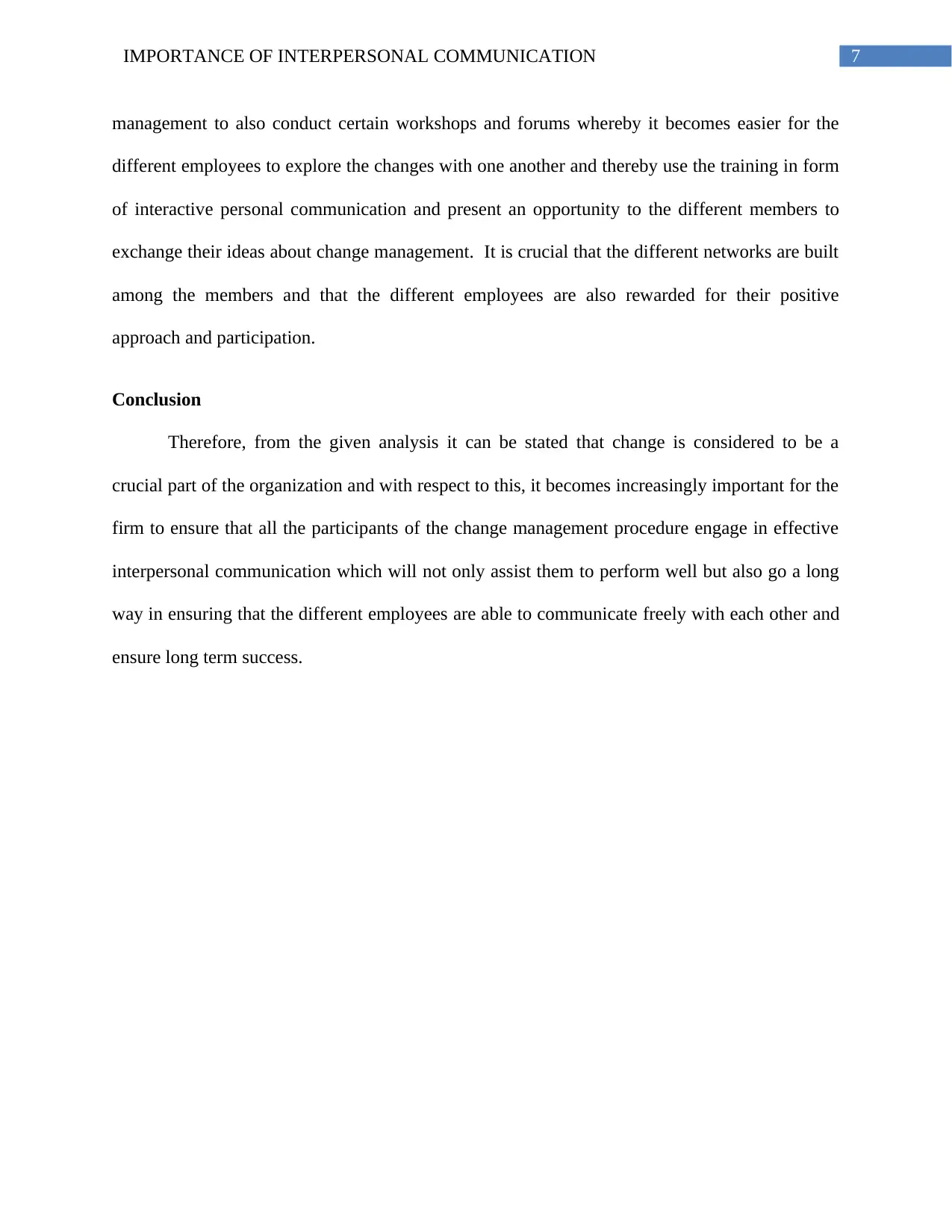
7IMPORTANCE OF INTERPERSONAL COMMUNICATION
management to also conduct certain workshops and forums whereby it becomes easier for the
different employees to explore the changes with one another and thereby use the training in form
of interactive personal communication and present an opportunity to the different members to
exchange their ideas about change management. It is crucial that the different networks are built
among the members and that the different employees are also rewarded for their positive
approach and participation.
Conclusion
Therefore, from the given analysis it can be stated that change is considered to be a
crucial part of the organization and with respect to this, it becomes increasingly important for the
firm to ensure that all the participants of the change management procedure engage in effective
interpersonal communication which will not only assist them to perform well but also go a long
way in ensuring that the different employees are able to communicate freely with each other and
ensure long term success.
management to also conduct certain workshops and forums whereby it becomes easier for the
different employees to explore the changes with one another and thereby use the training in form
of interactive personal communication and present an opportunity to the different members to
exchange their ideas about change management. It is crucial that the different networks are built
among the members and that the different employees are also rewarded for their positive
approach and participation.
Conclusion
Therefore, from the given analysis it can be stated that change is considered to be a
crucial part of the organization and with respect to this, it becomes increasingly important for the
firm to ensure that all the participants of the change management procedure engage in effective
interpersonal communication which will not only assist them to perform well but also go a long
way in ensuring that the different employees are able to communicate freely with each other and
ensure long term success.
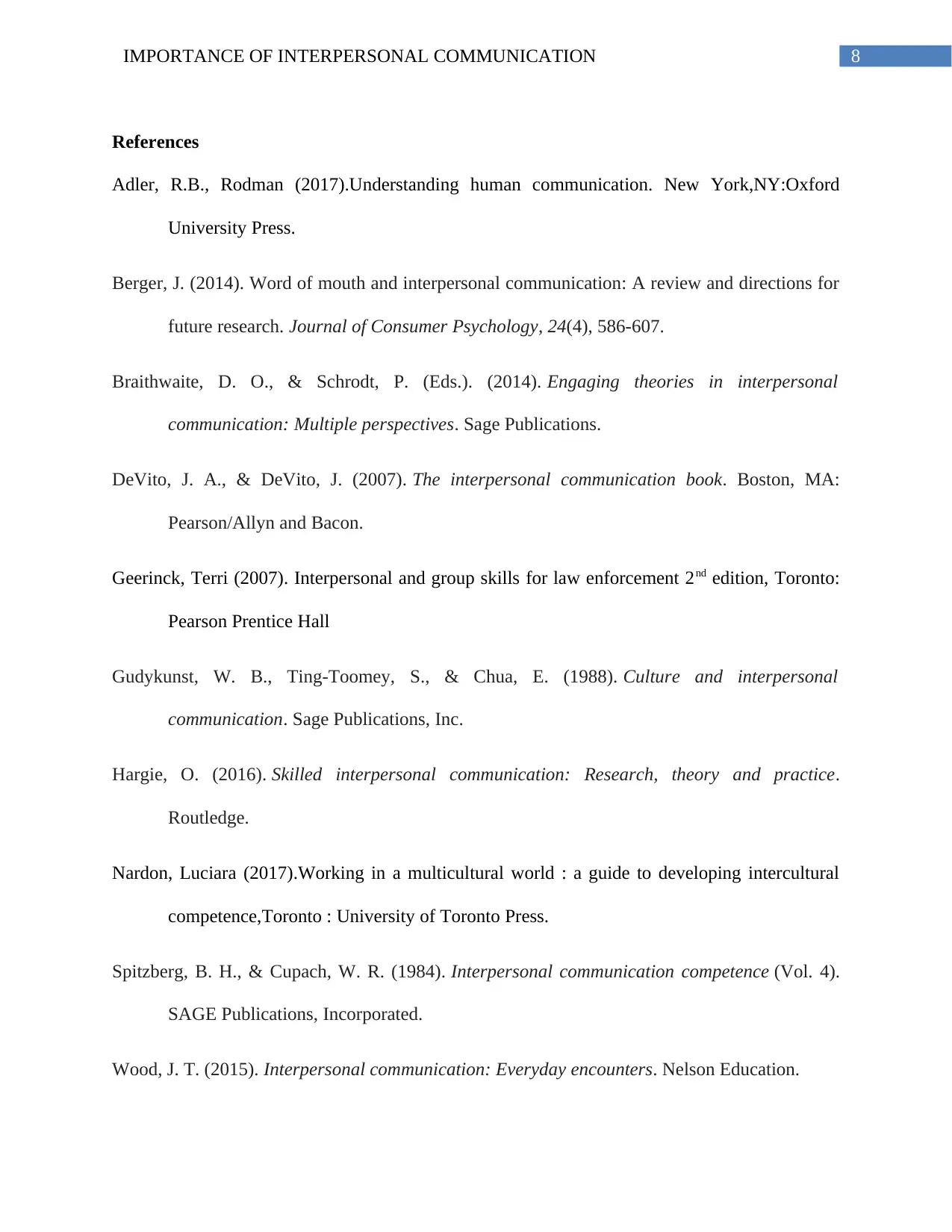
8IMPORTANCE OF INTERPERSONAL COMMUNICATION
References
Adler, R.B., Rodman (2017).Understanding human communication. New York,NY:Oxford
University Press.
Berger, J. (2014). Word of mouth and interpersonal communication: A review and directions for
future research. Journal of Consumer Psychology, 24(4), 586-607.
Braithwaite, D. O., & Schrodt, P. (Eds.). (2014). Engaging theories in interpersonal
communication: Multiple perspectives. Sage Publications.
DeVito, J. A., & DeVito, J. (2007). The interpersonal communication book. Boston, MA:
Pearson/Allyn and Bacon.
Geerinck, Terri (2007). Interpersonal and group skills for law enforcement 2nd edition, Toronto:
Pearson Prentice Hall
Gudykunst, W. B., Ting-Toomey, S., & Chua, E. (1988). Culture and interpersonal
communication. Sage Publications, Inc.
Hargie, O. (2016). Skilled interpersonal communication: Research, theory and practice.
Routledge.
Nardon, Luciara (2017).Working in a multicultural world : a guide to developing intercultural
competence,Toronto : University of Toronto Press.
Spitzberg, B. H., & Cupach, W. R. (1984). Interpersonal communication competence (Vol. 4).
SAGE Publications, Incorporated.
Wood, J. T. (2015). Interpersonal communication: Everyday encounters. Nelson Education.
References
Adler, R.B., Rodman (2017).Understanding human communication. New York,NY:Oxford
University Press.
Berger, J. (2014). Word of mouth and interpersonal communication: A review and directions for
future research. Journal of Consumer Psychology, 24(4), 586-607.
Braithwaite, D. O., & Schrodt, P. (Eds.). (2014). Engaging theories in interpersonal
communication: Multiple perspectives. Sage Publications.
DeVito, J. A., & DeVito, J. (2007). The interpersonal communication book. Boston, MA:
Pearson/Allyn and Bacon.
Geerinck, Terri (2007). Interpersonal and group skills for law enforcement 2nd edition, Toronto:
Pearson Prentice Hall
Gudykunst, W. B., Ting-Toomey, S., & Chua, E. (1988). Culture and interpersonal
communication. Sage Publications, Inc.
Hargie, O. (2016). Skilled interpersonal communication: Research, theory and practice.
Routledge.
Nardon, Luciara (2017).Working in a multicultural world : a guide to developing intercultural
competence,Toronto : University of Toronto Press.
Spitzberg, B. H., & Cupach, W. R. (1984). Interpersonal communication competence (Vol. 4).
SAGE Publications, Incorporated.
Wood, J. T. (2015). Interpersonal communication: Everyday encounters. Nelson Education.
⊘ This is a preview!⊘
Do you want full access?
Subscribe today to unlock all pages.

Trusted by 1+ million students worldwide

9IMPORTANCE OF INTERPERSONAL COMMUNICATION
1 out of 10
Related Documents
Your All-in-One AI-Powered Toolkit for Academic Success.
+13062052269
info@desklib.com
Available 24*7 on WhatsApp / Email
![[object Object]](/_next/static/media/star-bottom.7253800d.svg)
Unlock your academic potential
Copyright © 2020–2026 A2Z Services. All Rights Reserved. Developed and managed by ZUCOL.




